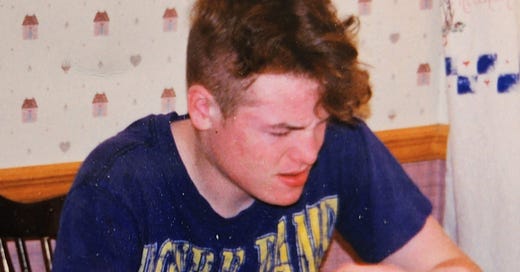Most words have a well-defined, easily traceable origin. I’ve written a bunch about those types of words.
There’s another type of word that defies easy origins. Lollapalooza is one such word. It doesn’t come from Latin or Greek origins, and its earliest print examples from the 1890s are scarce. During the early 20th century, it came to mean a fantastic event where lots of good things happened.
In 1991, Perry Farrell dug this word out from the dustbin of another era. Farrell claims he heard this term in an old Three Stooges film, and the math really does check out. Three Stooges and Little Rascals shows were always on TV when I was a kid, and they always felt like a portal into a bygone era.
Farrell wanted to commemorate the end of his band, Jane’s Addiction, by doing something really special. He wanted to have a really big farewell tour with lots of friends and great music, but Farrell wanted to do something unique. His idea was to have a truly eclectic mix of artists who weren’t pigeonholed by one particular genre.
In other words, he wanted a lollapalooza of acts.
By the time of the first Lollapalooza festival, I was fifteen-turning-sixteen. Nirvana’s Nevermind had just been released, and I bought it almost immediately after seeing Smells Like Teen Spirit on MTV’s 120 Minutes on September 29th, 1991 (not that it was a super important moment for me or anything).
It wasn’t until 1992 that I ventured out into the relatively safe field of outdoor amphitheaters (Steppenwolf) and indoor auditoriums (the Black Crowes), and then I was off to the races with smallish punk rock shows. The energy from the small punk shows was overwhelmingly intoxicating.
Grunge was often classified as alternative music, but by 1993, everyone was wondering the same thing: alternative to what? In other words, the bands that were countercultural were now simply mainstream. Meanwhile, my own ethos was pointing me in the exact opposite direction. For this reason, I very nearly missed my Lollapalooza window.
Nevertheless, I let myself have some fun and really enjoy the bands I got to see, even though my own musical tastes were going in a very different (and less mainstream) direction. I can’t tell you how glad I am that I gave myself permission to dance to the likes of Alice in Chains, Primus, Arrested Development, and Fishbone.
I couldn’t find a video of Alice in Chains from the venue I saw (Charlotte, NC), but this compilation of some shows from the year is pretty cool if you want to get some idea of what their performance was like:
I moshed in the mud with like 200 other people in a circle. We danced and shoved each other to bands that were, more or less, already mainstream. It was… weird.
But it was incredible fun.
Did you attend any Lollapalooza festivals during the 90s? Did you mosh in the mud?





"...a truly eclectic mix of artists who weren’t pigeonholed by one particular genre...."
The old show business institution vaudeville was very much like this, since musical performers were featured on the same bill with comedians and more exotic performers, such as trained animals or acrobats. It was really there where the current obsession with getting the audience's attention immediately and keeping it began, because if the act couldn't do that, it got sacked. Nearly all of the greatest comedians of the 20th century were employed in it at one time or another.
Whereas "lollapalooza" doesn't have a clear origin, "vaudeville" does: it's an English corruption of the French term "Vaux De Ville" (Voice Of The City).
While I did not attend any Lollapaloozas in the 90s, I did manage to attend what was arguably the largest toga party in history at the University of Wisconsin-Madison in 1978. I'm hoping there are no photos of me.